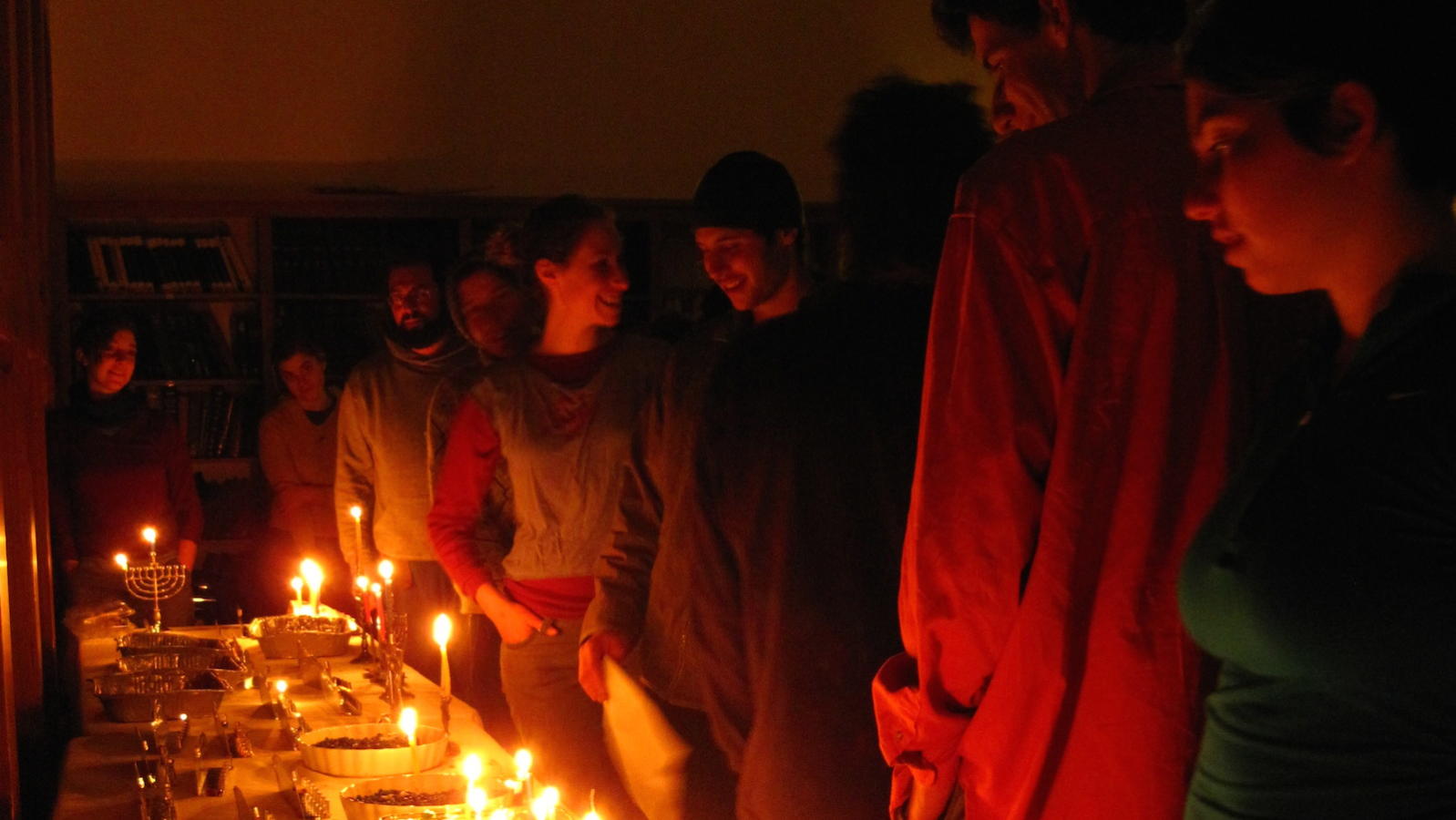O mighty stronghold of my salvation, to praise You is a delight. Restore my House of Prayer and there we will bring a thanksgiving offering, When You will have prepared the slaughter for the blaspheming foe, Then I shall complete with a song of hymn the dedication of the Altar.
The warm glow of freshly lit candles fills the room, my family stands arm in arm, and as the wick of the last candle is ignited, we gleefully burst into a rousing rendition of the first stanza of Ma’oz Tzur. Somebody laughs as battling versions from my mom’s family and my dad’s family try to out-sing each other; my brother sticks in some extra jazzy notes and be-bops, and after a couple of rounds of the same stanza, we leave the song behind in eager anticipation of the exchanging of gifts.
The memory and the feeling is one of warmth and joy, togetherness and peace. No attention is ever paid to the actual words that we sing, but rather the tune, the song, the joy in the moment.
Taking a Look at the Hebrew
In college I started taking Hebrew more seriously. I will never forget the first time my Hebrew was good enough to understand the words I was singing to this joyful tune. The warm peacefulness of the moment was shattered by the reality of the words’ meaning. There was a sharp dissonance between the feeling of the ritual and the words on the page. Were we really singing that God should prepare the destruction of another people, even if those people were our enemies?
And would we really sing such a request in such a joyous manner? Hadn’t I been taught at Passover; when we remove wine from our glass in honor of the Egyptians who died, that when our enemies die, we acknowledge their death regretfully and sadly? Why was the tune to these words so joyful?
Why must this evening–one of family togetherness and giving, when we celebrate the survival of our Jewish identity, our liberation from religious oppression, and the miracle of light in moments of darkness–be tinged by a song that beseeches God to carry out violence on our behalf? Where is the line that separates celebrating our freedom and liberation from celebrating the slaughter of those who oppress us? Is it not possible to mark a holiday or to live a life that celebrates our freedom without seeking vengeance on our former oppressors?
Perhaps it could be argued that having such a text actually serves a healthy and cathartic service. The song can be viewed as an opportunity for a redirection of national anger and as an outlet for our vengeful emotions, allowing us the opportunity to sublimate the desire to physically harm those who have oppressed us. However, a text such as this is not an isolated incident in our tradition.
Where Else Do We Find Words Like These?
Expressions, prayers, and songs that ask God to wreak violence on our behalf appear throughout our liturgy, tradition, and holiday texts. Daily in the traditional Amidah, three times a day, we praise a God who “breaks enemies and subdues scoundrels;” and we ask God to “destroy God’s enemies.” On Passover we open our doors and declare that God should pour out God’s wrath on our enemies; and in the prayer for the Israel Defense Forces, we don’t just pray for strength for Israel’s army, but we go further to say, “May God cause the enemies who rise up against us to be struck down before them.”
Thus, rather than sublimate a desire for physical aggression, does the repetition of such ideas in our liturgy encourage, affirm, or instigate violence toward those who once oppressed us, even when we are free?
When confronted with such texts in our liturgy–for those of us who find such texts uncomfortable or abhorrent–there are a variety of possible responses. We can rationalize their existence as an outgrowth of the time in which they were created, when physical anti-Semitism was rampant. We can counterbalance them with a textual tradition that is peace-loving and accepting of our enemies, such as, “Who is a hero? One who turns an enemy into a friend” (Avot d’Rabbi Natan).
Reinterpreting the Enemy
We can reinterpret “the enemy,” by psychoanalyzing the external enemy into an internal enemy. Or perhaps we can do nothing. What are the ethical implications if we acknowledge and welcome into our tradition the existence of vengeful, violent, war-loving texts that pray to a God who slaughters our enemies and who kills on our behalf?
How can it be that these prayers have their place alongside the prayers in our liturgy for peace, justice, forgiveness, and compassion or that uttering both kinds of prayers is part of the inner spiritual life of a Jew? It seems that the journey to let both traditions live within us is part of our religious process. Can we allow ourselves to dwell with this discomfort and to accept it into ourselves? Furthermore, how does it affect the way we treat others and live our lives?
To accept a vengeful God alongside a compassionate and forgiving God requires us to accept a more complicated inner life, a spiritual life that is not black and white, but is complex and nuanced. It demands our responsibility, good judgment and sincere and critical thinking. It exhorts us to think sensitively when we call upon God and reflect thoughtfully when we consider which image of God we turn to.
There are ethical implications to believing in a vengeful and violent God alongside a compassionate and peace-creating God, and they obligate us to live a life of tremendous accountability. For how could we ever truly know when it is right to pray for the death of another human being?
Reprinted with permission from Celebrating the Jewish Year: The Winter Holidays, published by Jewish Publication Society.
Explore Hanukkah’s history, global traditions, food and more with My Jewish Learning’s “All About Hanukkah” email series. Sign up to take a journey through Hanukkah and go deeper into the Festival of Lights.

Help us keep Jewish knowledge accessible to millions of people around the world.
Your donation to My Jewish Learning fuels endless journeys of Jewish discovery. With your help, My Jewish Learning can continue to provide nonstop opportunities for learning, connection and growth.



